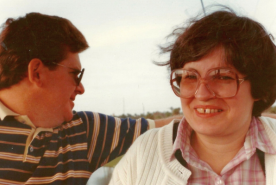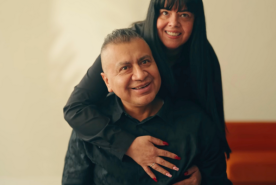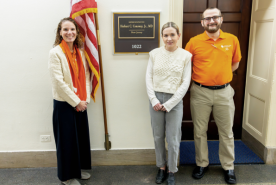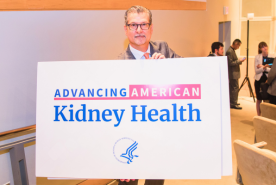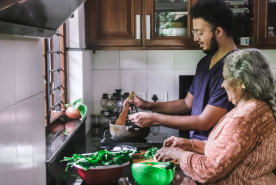December 20, 2019
It’s a new year, and time for a new you. Time to get healthy, right?
It’s not always that simple. We know that most people want to lead healthy lives that will prevent illnesses and keep their bodies functioning well. They just need the information about how to do it.
Your first step is to know your risks. Look around. If you see three people in the room, at least one of you could be at risk of life-threatening kidney disease and you need to know if it’s you.
What is kidney disease?
Kidney disease means your kidneys are damaged and losing their ability to keep you healthy. It causes more deaths than breast cancer or prostate cancer and is a public health crisis in America. It affects an estimated 37 million people in the U.S., an alarming number that has been rising for decades.
In the early stages of the disease, most people don’t have symptoms. But as it gets worse, waste builds up in your blood and makes you feel sick. You may develop other problems too, like high blood pressure, anemia, weak bones, poor nutritional health, and nerve damage. While these problems may happen slowly and without symptoms, kidney disease can lead to kidney failure, which can strike without warning.
Once a person’s kidneys fail, he or she will eventually need dialysis or a kidney transplant to stay alive.
Know the risks
Since kidney disease usually starts with silent symptoms, it is important to know the risks. If you have any of these conditions, you should talk to your primary care physician about kidney health:
- Diabetes, Type 1 or Type 2
- High Blood Pressure
- Heart Disease
- Family history of kidney disease
- Obesity
You are not alone
Information leads to changes
Kantar found that respondents were more apt to change their behaviors once educated about kidney disease and the severity; knowing that kidney disease could lead to dialysis or a transplant encouraged patients to take action sooner rather than later; two-thirds of patients who learned of this plan to visit their doctor within three months; and more than half plan to change their behavior.
The poll found that:
- 55 percent of respondents who learned that their comorbidity increases risk of developing kidney disease are likely or very likely to ask their doctor about it;
- Knowing that kidney disease could lead to patients requiring dialysis or a transplant means that the majority of those at risk, 70 percent, are encouraged to take action sooner rather than later;
- 67 percent of patients are planning to visit their doctor in the next three months, and 52 percent plan to change their behavior.
Speak up at your next appointment
Unfortunately, 1 out of 3 respondents (34 percent) said they have never spoken to their doctor about kidney disease and only 18 percent said they had a recent conversation with a doctor about kidney disease. Women (42 percent) were more likely than men (25 percent) to have never had a conversation with a doctor about kidney disease.
How big is the problem?
Kidney disease is the most under-recognized public health crisis in America. It affects 15 percent of the adult population; more than 1 in 7 adults and approximately 90 percent of those with kidney disease don’t even know they have it. About 80 million people are at risk for kidney disease. It is more common in women (15 percent) than men (12 percent). It is the 9th leading cause of death in the U.S.
Are there symptoms?
Most people do not have any severe symptoms or signs that they have kidney disease until the condition gets worse. While the best way to know if you have kidney disease is to get tested, you may:
- feel more tired than usual
- have less energy
- have trouble thinking clearly
- have a poor appetite
- have trouble sleeping
- have dry, itchy skin
- have muscle cramping at night
- have swollen feet and ankles
- have puffiness around your eyes, especially in the morning
- need to urinate more often, especially at night
What should you do?
If you fall into any of the risk categories, you should talk to your primary care physician about getting tested annually for kidney disease. Two simple tests, one common blood test and urine test, can help determine if you have kidney disease.
Ask your doctor about the “Kidney Profile,” the laboratory name of the tests that measure the estimated glomerular filtration rate (eGFR) in the blood and levels of albumin in the urine, known as the urine albumin to-creatinine ratio (UACR).
This combination of eGFR and UACR testing has been shown to be a strong predictor of kidney failure risk.
You can also speak to a registered dietitian nutritionist (RDN) about eating a diet that can help maintain your kidney health and maybe even slow progression of kidney disease.
Why does this matter?
Tragically, 12 people on average die every day waiting for a kidney transplant. Kidney disease costs America billions of dollars every year. In 2018, $114 billion in Medicare funds were spent on kidney disease and end-stage kidney disease, according to the U.S. Renal Data System.
What can you to do right now?
- Take the NKF Kidney Health Assessment
- Find a free health-check near you.
- Make a doctor’s appointment.

